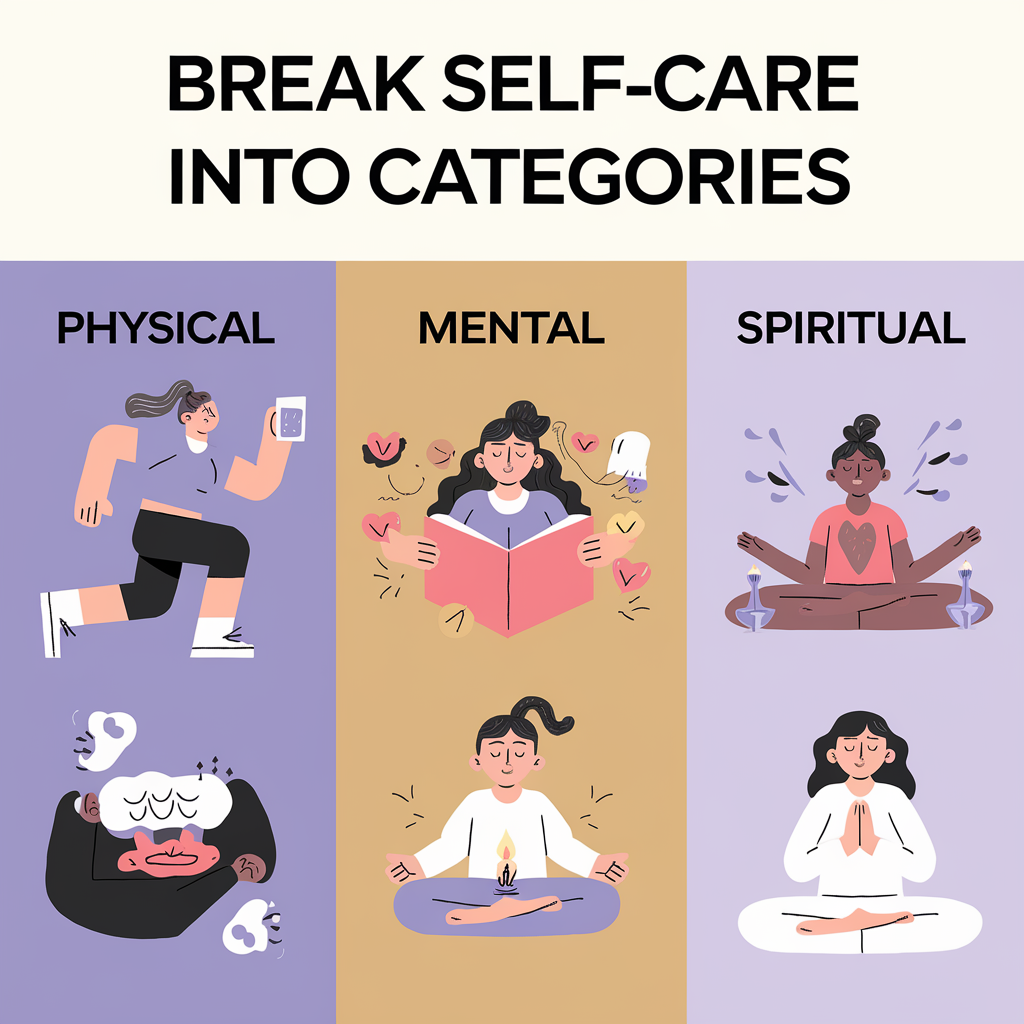How to Create the Ultimate Self-Care Checklist
A modified self-care checklist is an influential tool for keeping balance and well-being in daily life. It helps meet essentials regularly, whether you’re a busy professional, a parent, or somebody seeking mental, physical, and emotional health improvement. By breaking down self-care into practicable steps, you can tailor the checklist to fit your routine and prioritize actions that nourish you.

1. Assess Your Current Needs
To generate a self-care checklist, first recognize your needs. This contains events like physical care, emotional support, and mental relaxation. Estimate your current general by determining your physical, emotional, and mental well-being. This helps recognize gaps in your routine and areas that need more attention. Then, create a checklist that contains activities that challenge or relax your mind, ensuring you are getting enough sleep, proper nutrition, and exercise. This will affect the structure of your self-care routine.
2. Break Self-Care Into Categories
A self-care checklist classifies physical, emotional, mental, and mystical self-care into distinct types for complete and effective well-being, ensuring all aspects are addressed, reasonably rather than focusing exclusively on one area.
Physical Self-Care
Physical self-care includes keeping body health through actions like exercise, nutrition, sleep, hydration, and regular check-ups. It includes planning mealtimes with a balanced nutrient intake, ensuring 7-9 hours of sleep, drinking sufficient water daily, and appearing regular check-ups to attend to your body’s needs.
Emotional Self-Care
Emotional self-care includes managing and treating feelings through journaling, therapy, companionship, and setting limits. Journaling helps procedure thoughts, therapy helps in analysis, companionship fosters connection, and setting boundaries keeps emotional energy by saying “no” when necessary.
Mental Self-Care
Mental self-care includes inspiring the mind and falling stress complete actions like reading, puzzles, games, and learning new services and thoughts. Attraction in these events keeps the brain sharp, while mindfulness helps clear the mind and reduce stress.
Spiritual Self-Care
Spiritual self-care involves involving with a deeper sense of purpose complete meditation, prayer, outdoor activities, and acts of kindness, such as offering or helping others to stand in a sense of belonging.

3. Create Daily, Weekly, and Monthly Checklists
Break down self-care activities into adaptable timeframes like daily, weekly, and monthly to decrease overwhelm and ensure they naturally fit into your schedule.
Daily Self-Care Checklist
Focus on small, maintainable habits in daily actions, such as drinking 8 glasses of water, being attractive in a 15-minute yoga session, journaling gratitude, and taking a 10-minute break for mindfulness or meditation
Weekly Self-Care Chewater, beingcklist
Weekly self-care should include deep, focused happenings like nature walks, learning a new skill, spending time with loved ones, and being attractive in creative activities like painting, writing, or crafting. These activities need more time and focus to maintain overall well-being.
Monthly Self-Care Checklist
A monthly checklist can be used to assemble long-term goals or activities that promote well-being, such as the development of a massage or spa day, decluttering a detailed area, taking a day off for rest, and monitoring individual or professional goals.
4. Personalize Your Self-Care Checklist
An effective self-care checklist requires personalization, and considering lifestyle, preferences, and budget. Alternatives like dance classes, home workouts, or self-help books, meditation apps, or support groups can be used if professional therapy isn’t available. Ensure the checklist aligns with your current situation and don’t hesitate to adjust it over time, as your needs may change, and your self-care should evolve accordingly.
5. Make Self-Care a Priority
Consistency is important in making a fruitful self-care checklist. Schedule activities similar to work meetings or schedules set reminders, block off time, and treat self-care as a non-negotiable routine. Arranging these actions will make them second nature, leading to an improving, more balanced life. Recall to plan for self-care activities like work meetings or appointments.
A self-care checklist is an important implement for protecting mental, emotional, physical, and spiritual health It includes breaking down actionable stages into specific steps and personalizing them to fit your lifestyle. By assessing your needs, arranging your checklist, and prioritizing self-care, you can create a maintainable routine that supports your complete health and happiness.

What is self-care?
Self-care is the intended action and shares to improve and remain one’s physical, mental, and emotional well-being. It includes keeping balance and meeting needs regularly. However, several people struggle to constantly prepare for self-care, especially during motivated times. A well-designed self-care checklist can help participants incorporate self-care into daily procedures and remind persons to select their well-being. Before making a checklist, it’s essential to understand the changed aspects of self-care and their importance.
Self-care is an exclusive idea that works for everybody, restoring physical health and restful emotional states, improving the mind, and involving to a deep sense of resolve. It’s a preventative measure for overall fitness, avoiding burnout, reducing stress, and achieving the excellence of life. By adapting actions to suit separate requirements, self-care helps resilience and assistance manage environmental difficulties more successfully. By thinking of self-care as a share of daily life, people can think of it as a technique to continue their ability and well-being.
Why is Self-Care Important?
Self-care is frequently mistaken as an extra, but it is key for maintaining mental and physical fitness. It ensures ideal functioning and stops neglect of important features of well-being. Applying a self-care checklist helps repeatedly address these needs.
The Benefits of Regular Self-Care
Improved Mental Health
Regular self-care, such as a walk or meditation, can meaningfully decrease stress and anxiety, preventing them from falling into more severe mental fitness issues, making it important to include mental health-focused activities in your checklist.Better Physical Health
Self-care is essential for maintaining physical health, boosting the protection method, and improving energy levels. Prioritizing body requirements like exercise, diet, and sleep boosts the resistant system. A self-care checklist, with stretching, hydration, and sleep routines can have long-term positive special effects.Enhanced Emotional Resilience
Self-care observations, such as journaling and involving with loved ones, can assist persons in navigating life’s emotional tasks more successfully. By containing these in your checklist, you can handle hard situations with better expressive balance, improving your ability to handle life’s challengesIncreased Productivity
Regular self-care can improve efficiency by successful mental and physical health, assisting better attention, clearer decision-making, and improved energy. A self-care checklist that comprises both healing and motivating activities helps keep the gentle balance between work and rest, despite the apparently counterintuitive environment of self-care.
Self-Care as a Lifelong Practice
Self-care is a constant development that needs commitment and changes to suit one’s requirements. A self-care checklist helps us track and reminds us of its significance. Manufacture self-care as a routine is the best actual method to repeat it. It’s about intended time organization, setting aside instants for rest, innovation, and growing.
Types of Self-Care
A general self-care checklist must involve physical, emotional, mental, and spiritual features of your life. It’s not just about attractive time off or releases; it’s a complete approach that addresses all areas of well-being. Including changed types of self-care into your daily routine safeguards, you’re addressing all features of your well-being.
1. Physical Self-Care
Physical self-care is important for maintaining successful physical fitness, as the body is the basis of all activities. It includes attractive in activities that help fitness, health, and overall well-being, which can be included in a self-care checklist.
Exercise: Regular physical movement, whether it’s successively, yoga, or weightlifting, assistances to keep your body strong and energetic.
Sleep: Select getting 7-9 hours of excellent sleep each night. Sleep is key for both physical recovery and mental clarity.
Nutrition: Eating stable meals full of nutrients gives your body the fuel it needs to succeed at its best. Contain meal preparation or aware eating as part of your checklist
Hydration: Drinking sufficient water daily is important for your body’s basic functions. Aim for 8 glasses a day and include this cue in your checklist.
Healthcare: Regular health check-ups and addressing any health anxieties should be involved in your routine.
By constantly adding physical self-care responsibilities to your self-care checklist, you’ll keep your body’s fitness, which completely affects your energy levels and overall productivity.
2. Emotional Self-Care
Emotional self-care includes identifying and organizing emotions, handling positive and negative views, and generating a safe environment. It includes including activities in a checklist to promote emotional well-being.
Journaling: Writing down your beliefs and feelings assists in the development of reactions and reduces stress.
Therapy: ·Speaking with an analyst or therapist can be extremely beneficial, offering you practiced direction and maintenance for your emotional well-being.
Setting Boundaries: Knowing when to say “no” and protecting your expressive energy is key to keeping an emotional balance. Contain prompts to set or enforce limits in your checklist.
Expressing Gratitude: Take an instant each day to reproduce on what you’re glad for. This exercise helps positive thinking and emotional flexibility.
Spending Time with Loved Ones: Emotional self-care also means the development of your relationships. Select superiority time with friends or family in your self-care routine.
By adding emotional self-care to your self-care checklist, you’re making space for a healthy emotional look and reducing the chances of emotional burnout.
3. Mental Self-Care
Mental self-care includes activities that inspire and relax the mind, marking to decrease stress, improve cognitive aptitudes, or invent mental peace. To improve this, consider containing jobs in your self-care checklist.
Reading: Involve in books, articles, or blogs that interest or stimulate you. Reading helps broaden your viewpoint and keeps your mind sharp.
Mindfulness & Meditation: Taking time for mindfulness practices, like meditation, can assist you to clear your mind and decrease stress.
Learning: Pick up a new relaxation or skill, whether it’s complete online developments or hands-on experiences. Lifelong learning is excessive for keeping your
Brain Games: Contain puzzles, crosswords, or brain-training apps in your self-care checklist to keep your reasoning assistance sharp.
Unplugging from Technology: Taking breaks from screens is key for mental clarity. Include “digital detox” periods in your routine to refresh your mind.
Including mental self-care activities into your daily repetitive safeguards that your mind stays alert and helps prevent mental fatigue.
4. Spiritual Self-Care
Spiritual self-care includes connecting with a difficult purpose or certainty system that provides life meaning, and it doesn’t have to be spiritual; it can be nearby reflective on what correctly realizes you. To improve it, expect to calculate these to your self-care checklist.
Meditation or Prayer: Regular thought or prayer consents you to attach secretly, foundation by hand and imitating on life’s more meaning.
Time in Nature: Expenditure time out-of-doors can relieve your impression extra to the world around you. Walking in a park, hiking, or even gardening will be able to carry a sense of peace and belonging.
Acts of Kindness:: Selection others, whether through volunteering or casual acts of gentleness, can adoptive a sense of resolve and success.
Self-Reflection: Taking time for a profound image of your objectives, values, and views is key to developing your mystical well-being. This could be complete journaling or silent time to think.
Including spiritual self-care in your self-care checklist helps you stay associated with your internal self and the creation around you, helping a sense of harmony and determination in your life.
5. Social Self-Care
Social self-care is crucial for structuring and maintaining strong relationships, developing healthy influences, and safeguarding positive interactions. Include these responsibilities into your self-care checklist for social well-being.
Reconnect with Friends: Usual regular check-ins with friends or family, whether through a quick phone call, coffee date, or online chat.
Join a Group: Involve in group activities or weapons where you can meet different people and bond over common interests.
Set Boundaries: Social self-care isn’t just about spending time with others. It also includes recognizing that it is essential to step back and recharge. Don’t hesitate to decline invitations when you need alone time.
By including social self-care events in your routine, you can reinforce relationships that develop and support your emotional fitness.
Building a Balanced Self-Care Checklist
A complete self-care checklist should shelter several types of self-care, including physical, emotional, mental, spiritual, and social, to keep balance and flexibility in daily life. Diversifying self-care applies and regular examination of oneself can safeguard a routine that supports complete health.
How to Create a Self-Care Checklist
A modified self-care checklist is a fundamental plan for keeping physical health, improving mental clarity, and achieving emotional balance. It helps as a structured leader, ensuring daily, weekly, and monthly needs are met without feeling overwhelmed. A step-by-step controller is provided to create a self-care checklist that really works for you.
1. Identify Your Needs
To create a thorough self-care checklist, measure your current well-being by approximating your physical, emotional, mental, and spiritual well-being. This will help you identify areas that need more effectiveness and create a practical checklist that addresses your supplies in these areas. By focusing on your physical health, emotional health, mental health, and spiritual association, your container makes a complete and focused method to improving your overall well-being. This will help you achieve enough sleep, nutrition, exercise, and mental stimulation.
2. Set Clear, Achievable Goals
To create a current self-care checklist, set specific, accurate goals for each area of emphasis, safeguarding it’s complete and possible, and break it down into practicable parts.
Daily Goals: These must be simple, everyday activities that contribute to your overall well-being, such as intake enough water, taking a little walk, or setting aside 10 minutes for meditation.
Weekly Goals: These strengths include actions like exercising for 30 minutes a few times a week, catching up with a friend, or doing something creative.
Monthly Goals: Larger self-care movements that involve more time, such as developing a spa day, taking a weekend trip, or effecting a self-improvement course, fall into this category.
Your self-care checklist should contain a mix of these timeframes to maintain that you’re meeting your short-term and long-term needs.
3. Divide Your Self-Care into Categories
A comprehensive self-care checklist classifies several features of your well-being, safeguarding complete health coverage across all areas, with main groups including:
Physical Self-Care
Keeping an effective physical health includes actions like exercising for 30 minutes, consuming 8 glasses of water, getting 7-9 hours of sleep, and extending for 10 minutes in the morning.
Emotional Self-Care
Emotional self-care includes treatment and handling feelings, which can be finalized through journaling, spending time with loved ones, difficult appreciation, and setting boundaries by saying “no” when necessary.
Mental Self-Care
Mental self-care includes keeping a sharp and relaxed attention through actions like reading, puzzle solving, brain games, mindfulness, meditation, or learning a new hobby or skill. These actions help maintain focus and relaxation.
Spiritual Self-Care
Spiritual self-care includes actions that connect you to a profound sense of purpose. It contains daily meditation, prayer, nature or grounding exercises, volunteering for a desire, and reflecting on goals and standards through journaling. Breaking down your self-care checklist into these types ensures you are nurturing your body, mind, emotions, and spirit.
4. Make It Personal
Self-care should be tailored to your unique lifestyle, preferences, and goals. Consider activities like home workouts, outdoor activities, art or music for emotional expression, or affordable or free options like walking, meditation, or yoga at home. Comprise events that make you impression better and that you enjoy, such as hiking or cycling, or meditating or involved yoga at home.
5. Schedule Time for Self-Care
Many people fail to prioritize self-care due to not scheduling time for it. Treat your self-care checklist like a commitment, blocking out time in your calendar like a meeting or appointment. Set reminders for different time slots, such as stretching or reading, and stick to them to ensure consistent self-care, even in busy times.
6. Be Flexible and Adapt
As your life evolves, so do your self-care needs. Create a living checklist that adjusts as needed, such as finding a new hobby or dealing with stressors. Regularly revisit the checklist to ensure it meets your current needs. Be open to modifying the checklist if necessary, and focus on progress rather than perfection. Remember to scale back ambitious goals.
7. Track Your Progress
Tracking progress is a powerful motivator and accountability tool. Daily tasks, weekly goals review, and monthly self-care checklist reflections can help identify patterns, identify successful and unsuccessful practices, and gauge the overall improvement of self-care in overall well-being.
Conclusion
A self-care checklist is a structured method for prioritizing well-being. It involves assessing needs, setting goals, and scheduling time for self-care. This helps maintain a balanced lifestyle and handles life’s challenges. Self-care is an ongoing process, and starting small and staying consistent can significantly impact your life.
To be continued…………………

weed delivery near me available online